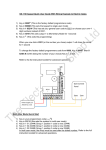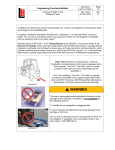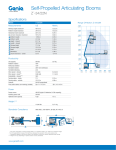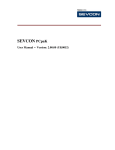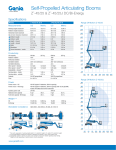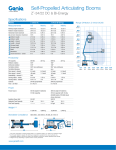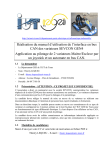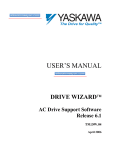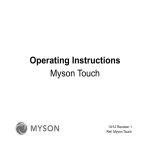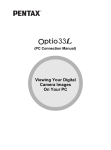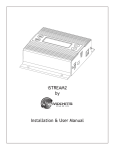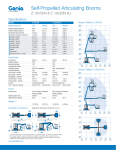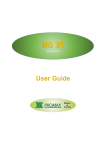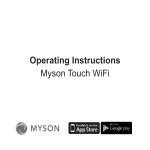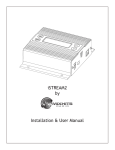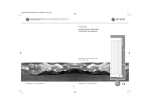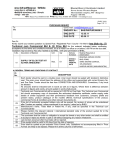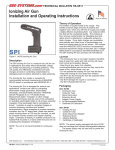Download Sevcon Gen4 Handheld Calibrator Manual
Transcript
CANopen Calibrator Reference Manual Document no: 177/52503 Rev. A Sevcon Ltd Kingsway South Gateshead, NE11 0QA England Tel +44 (0)191 497 9000 Fax +44 (0)191 482 4223 [email protected] Sevcon, Inc. 155 Northboro Road Southborough, MA 01772 USA Tel (508) 281 5500 Fax (508) 281 5341 [email protected] Sevcon SA 12 Rue Jean Poulmarch 95100 Argenteuil France Tel +33 (0)1 34 10 95 45 Fax +33 (0)1 34 10 61 38 [email protected] Sevcon Japan 4-12-1 Shinbashi Minato-Ku, Tokyo 105-0004 Japan Tel +81 (0) 3 (5408) 5670 Fax +81 (0) 3 (5408) 5677 [email protected] Sevcon Asia Ltd 4th Floor, Eun-Hyae Building 463-1, Sang-dong Wonmee-gu, Bucheon City Kyunggi-do 420-030 Korea Tel +82 (0)32 215 5070 Fax +82 (0)32 215 8027 [email protected] www.sevcon.com Table of Contents Chapter 1: Introduction 1-1 About CANopen Calibrator documentation .......................................... 1-2 This version of the manual .............................................................................................................. 1-2 Copyright ........................................................................................................................................ 1-2 Scope of this manual ....................................................................................................................... 1-2 Related documents .......................................................................................................................... 1-2 Drawings and units ......................................................................................................................... 1-2 Warnings, cautions and notes.......................................................................................................... 1-3 Product identification label .................................................................... 1-4 Technical support ................................................................................... 1-4 Product warranty .................................................................................... 1-4 Chapter 2: About the Calibrator 2-1 Introduction ............................................................................................ 2-2 Standard features and capabilities ......................................................... 2-2 Mechanical package ........................................................................................................................ 2-2 Intended use of the CANopen calibrator ........................................... Error! Bookmark not defined. Available accessories ...................................................................................................................... 2-3 Safety and protective functions ............................................................. 2-4 General ............................................................................................................................................ 2-4 Chapter 3: Connection 3-1 Connecting the Calibrator ...................................................................... 3-2 Connector ........................................................................................................................................ 3-2 CAN bus termination ...................................................................................................................... 3-2 Signal connections ................................................................................. 3-2 Chapter 4: Specification 4-1 Electrical ................................................................................................ 4-2 Input voltage ................................................................................................................................... 4-2 Output protection ............................................................................................................................ 4-2 CAN interface ................................................................................................................................. 4-2 Control inputs ................................................................................................................................. 4-2 Isolation .......................................................................................................................................... 4-2 EMC ................................................................................................................................................ 4-2 Regulatory compliance ................................................................................................................... 4-3 Mechanical ............................................................................................. 4-4 Operating environment ................................................................................................................... 4-4 Weight............................................................................................................................................. 4-4 Dimensions ..................................................................................................................................... 4-4 Chapter 5: Calibrator Usage 5-1 Principle of operation............................................................................. 5-2 Functional description ..................................................................................................................... 5-2 Navigation ....................................................................................................................................... 5-2 Splash Screen .................................................................................................................................. 5-3 System Overview ............................................................................................................................ 5-4 Personalities and Configuration ...................................................................................................... 5-5 Test ................................................................................................................................................. 5-6 Debug .............................................................................................................................................. 5-6 Faults and Logs ............................................................................................................................... 5-6 Calibrator Configuration and Software Update ..................................... 5-6 Configuration .................................................................................................................................. 5-6 Software Update.............................................................................................................................. 5-7 ii Doc. 177/52503 Rev A Chapter 1: Introduction About CANopen Calibrator documentation This version of the manual This version of the CANopen calibrator manual replaces all previous versions. Sevcon has made every effort to ensure this document is complete and accurate at the time of printing. In accordance with our policy of continuing product improvement, all data in this document is subject to change or correction without prior notice. Copyright This manual is copyrighted 2009 by Tech/Ops Sevcon. All rights are reserved. This manual may not be copied in whole or in part, nor transferred to any other media or language, without the express written permission of Tech/Ops Sevcon. Scope of this manual This manual provides information on how to use the CANopen calibrator and on which Sevcon products the CANopen calibrator is compatible with. Documents proving further details of contents of the CANopen calibrator trees and system fault help are referenced here. Related documents The following documents are available from Sevcon: • The Object Dictionary providing important information about CANopen communication with the CANopen calibrator. Drawings and units Orthographic illustrations in this manual are drawn in Third Angle Projection. SI units are used throughout this manual. 1-2 Doc. 177/52503 Rev A Introduction Warnings, cautions and notes Special attention must be paid to the information presented in Warnings, Cautions and Notes when they appear in this manual. Examples of the style and purpose of each are shown below: A WARNING is an instruction that draws attention to the risk of injury or death and tells you how to avoid the problem. A CAUTION is an instruction that draws attention to the risk of damage to the product, process or surroundings. A NOTE indicates important information that helps you make better use of your Sevcon product. Doc. 177/52503 Rev. A 1-3 Product identification label If you have a customized product your unique identifier will appear at the end of the Type number. When discussing technical issues with Sevcon always have your product’s Type number, Part number and Serial number available Error! Reference source not found. shows a typical product identification label. Technical support For technical queries and application engineering support on this or any other Sevcon product please contact your nearest Sevcon sales office listed on the inside front cover of this manual. Alternatively you can submit enquiries and find the details of the nearest support center through the Sevcon website, www.sevcon.com. Product warranty Please refer to the terms and conditions of sale or contract under which the CANopen calibrator was purchased for full details of the applicable warranty. 1-4 Doc. 177/52503 Rev A Chapter 2: About the Calibrator Introduction The CANopen calibrator can be used to assist in setting up and maintaining Sevcon CANopen compliant devices. It has the following features: • 240x320, 256 colour display. • Auto-baud rate detection. • System status overview. • Single and multi-node support. • Reads/writes a wide range of commonly used vehicle system settings. • Displays I/O + motor/vehicle status information • Displays any active faults and provides basic diagnostic information. • Fully flash programmable for calibrator software updates. Standard features and capabilities Mechanical package 2-2 Doc. 177/52503 Rev A About the Calibrator UP Button SELEC T Button DOWN Button Figure 1 Mechanical package Available accessories The following accessories are available from Sevcon: • External harness to connect to system • Drive Wizard - PC based configuration tool Doc. 177/52503 Rev. A 2-3 Safety and protective functions General Do not adjust the value of any parameter unless you fully understand the effect of this change. You should have read and understood the User Manual for all the connected devices before connecting the calibrator to them.. Do not attempt to open the calibrator as there are no serviceable components. Opening the calibrator will invalidate the warranty. Electric vehicles are subject to national and international standards of construction and operation which must be observed. 2-4 Doc. 177/52503 Rev A Chapter 3: Connection Connecting the Calibrator Connector The calibrator is supplied with a detachable external harness. CAN bus termination The calibrators primary function is to connect to an existing multi node fully terminated CAN bus. The calibrator contains no internal bus termination. The CANbus it connects to should already be properly terminated. If you use the calibrator with a single stand alone device then you should check that the connection is properly terminated by connecting a termination adapter to the external harness as required. If the calibrator fails to detect a standalone device then you should check that the CAN bus has correct termination Signal connections Pin Name Type What to connect Maximum rating 1 Not connected n/a Not connected 2 Gnd Power +24Volt supply return 3 Not connected n/a Not connected 4 VPos Power +24Volt supply 35V 5 CAN Hi Comms CAN Hi 35V 6 CAN Lo Comms CAN Lo 35V -35V Table 1 Connector A pin out and wiring information Pins are protected against short-circuits to the battery positive or negative voltages. 3-2 Doc. 177/52503 Rev A Chapter 4: Specification Electrical Input voltage Working voltage limits: 15V to 28.8V Input protection: Input protected against reverse connection of supply Maximum current draw 100mA Output protection Short-circuit: Protected against short circuit to supply CAN interface CAN protocol: CANopen profiles DS301, DS401 and DS402 are supported. Physical layer uses ISO11898-2. Baud rates supported: 1Mbits/s, 500 kbits/s, 250 kbits/s, 125 kbits/s, 100 kbits/s, 50 kbits/s Control inputs User interface 3 button keypad input Isolation Any terminal to the case: TBD (Gen4:Withstands 2 kV d.c. Meets EN1175-1:1998 and ISO3691 Complies with IEC-60664 EMC Radiated emissions: EN12895 (Industrial Trucks – Electromagnetic Compatibility) EN 55022:1998, 6, class B EN 12895:2000, 4.1 Emissions. When part of a system with a motor operating, FCC Part 15, Radiated Emissions. Meets the standards given in FCC Part 15, Section 15.109: Conducted emissions: No mains port, therefore not required Radiated RF field: EN 61000-4-3, 5.1 Test Level: user-defined test level of 12 V/m EN 12895:2000, 4.2 Immunity EN 61000-4-6, Table 1 - Test Levels Electrical fast transient: EN 61000-4-4, Table 1 - Test Levels, Level 2 4-2 Doc. 177/52503 Rev A Specification Electrostatic discharge: Electrical surge: EN 12895:2000, 4.2 Electrostatic Discharge 4 kV contact discharge 8 kV air discharge EN 61000-4-5:1995, Table A.1 – Selection of Test Levels, Class 3 Regulatory compliance Designed to meet: Doc. 177/52503 Rev. A EN1175-1:1998 (which covers EN1726 for the controller) ISO 3691 UL583 ASME/ANSI B56.1:1993 4-3 Mechanical Operating environment Operating temperature: -10°C to +50°C Non-operation temperature: -40°C to +85°C (can be stored for up to 12 months in this ambient range) Humidity: 95%(non-condensing) at 40°C and 3% at 40°C Ingress of dust and water: IP42 Weight Weight including external harness: 0.3 kg Dimensions . Figure 2 Dimensions 4-4 Doc. 177/52503 Rev A Chapter 5: Calibrator Usage Principle of operation Functional description The CANopen calibrator allows users to modify common settings on Sevcon devices and to provide basic diagnostic and fault finding capability. At power up or when connected to a CANbus, the calibrator can auto-detect the CANbus baud-rate by listening for heartbeat messages from other devices. Navigation To change between calibrator screens, press and hold the Select button until the calibrator menu appears. Figure 3 Calibrator Menu Release the Select button, then select the appropriate screen using the Up/Down buttons and press Select again. This can be done on any calibrator screen. As well as accessing screens, the menu can also be used to change a CANopen network from pre-operational to operational. Some configuration items can only be changed in pre- 5-2 Doc. 177/52503 Rev A Calibrator Usage operational. The system will not drive or close it’s line contactor if pre-operational, so always ensure the system is set back to operational after all changes are made. Most of the screens utilize tree structures to display information. To navigate the trees, use the Up/Down buttons to select tree nodes and branches and the Select button to expand/collapse branches. To change values, use the Select button to select the value, then Up/Down to change the value, then Select again to transmit the value to the controller. Splash Screen At power up the calibrator displays a splash whilst it analyses the CANbus network, identifies nodes and logs in to the system. Progress is shown at the bottom of the splash screen. Figure 4 Splash Screen The splash screen image can be made customer dependant. The example above is the generic Sevcon splash screen. Doc. 177/52503 Rev. A 5-3 System Overview The system overview screen is shown below. Figure 5 System Overview System status is represented by one of the following icons at the top of screen: The system is operational, with no active faults The system is operational, with active faults The system is pre-operational mode. This mode is used to set up parameters that cannot safely be change during normal operation. Each device in the network is displayed. Select a device to display more information and fault status. Press Select to cycle through each active fault on the selected device. 5-4 Doc. 177/52503 Rev A Calibrator Usage Personalities and Configuration Both these screens allow the system configuration to be modified. The Personalities screen displays the most commonly modified parameters. The Configuration screen displays additional parameters which can be modified. Figure 6 Personalities and Configuration Doc. 177/52503 Rev. A 5-5 Test This screen displays the state of all analogue and digital I/O. Only I/O which is configured for use in the system is displayed. This screen also displays battery voltage, hours counters and motor status. Figure 7 Test Debug This screen displays debug information for each device to assist with detailed performance or problem analysis. Faults and Logs These screens are reserved for future use to display fault and service log information. They are not yet available. Use DriveWizard to display this information instead. Calibrator Configuration and Software Update Configuration To change calibrator configuration, power up the calibrator with no CANbus connected. Use the Configuration menu to change calibrator settings. 5-6 Doc. 177/52503 Rev A Calibrator Usage The CANbus and Calibrator branches in the Configuration tree are reserved for the calibrator. These branches are still available even when other devices are connected to the CANbus. Software Update It is possible to update the firmware of the calibrator controller, using Sevcon’s DriveWizard configuration tool. Please contact Sevcon for assistance with this process. Doc. 177/52503 Rev. A 5-7

























